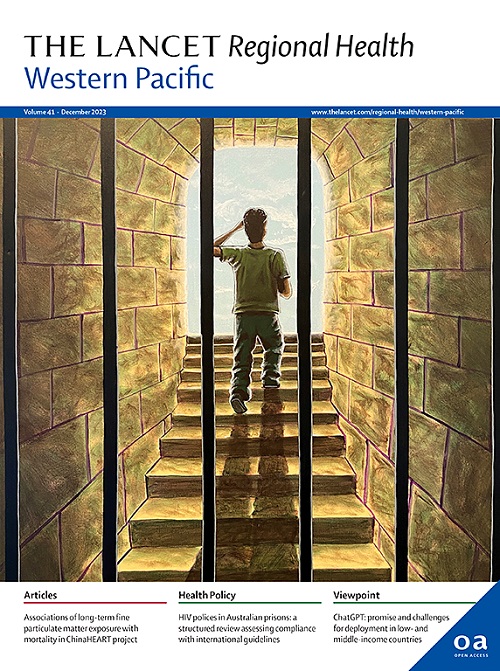A non-invasive multi-phase CT classifier for predicting pre-treatment enlarged lymph node types in colorectal cancer
IF 7.6
1区 医学
Q1 HEALTH CARE SCIENCES & SERVICES
引用次数: 0
Abstract
Background
Colorectal cancer (CRC) with benign lymph node enlargement (BLNE) (>1 cm) is often associated with better long-term prognosis and favorable outcomes in immunotherapy. However, lymph node enlargement (LNE) can mislead clinicians into considering metastatic lymph node enlargement (MLNE), potentially resulting in misguided therapeutic decisions in unnecessary neoadjuvant therapy and extended lymphadenectomy. This, ultimately, can lead to overtreatment, increasing the risk of postoperative complications and tumor recurrence. Thus, developing a pre-treatment multimodal CT radiomics-based model to assess LNE status is essential.
Methods
A total of 319 pre-treatment multimodal CT images of CRC patients with LNE were retrospectively collected from 2015 to 2020 as a development cohort. Additionally, 111 multimodal CT images from 2020 to 2022 were prospectively collected as a validation cohort. Tumor and LNE regions of interest were manually segmented, and 40 patients were randomly re-outlined by another radiologist to extract radiomics features. The intragroup correlation coefficient was calculated to assess the reproducibility of the radiomics features. Following feature screening, multiple predictive models were constructed, including tumor and lymph node models for individual modalities (TumorN, A, V; LnN, A, V; Ln, lymph node; N, non-contrast phase; A, arterial phase; V, venous phase), along with 15 models combining multiple modalities. The predictive performance of these models was assessed using area under the receiver operating characteristic curve (AUROC) and precision-recall curve (AUPRC), along with sensitivity, specificity, and accuracy.
Findings
After validation with the prospective cohort, TumorN and LnA demonstrated the best predictive performance among single modalities, with AUROC values of 0.626 and 0.781, respectively. Among all models, LnNAV exhibited the highest predictive performance, achieving AUROC and AUPRC values of 0.820 and 0.883, respectively, with a sensitivity of 0.708, specificity of 0.848, and overall accuracy of 0.766.
Interpretation
Radiomics, as a non-invasive and quantitative approach, can reflect underlying physiopathological information. The incorporation of a multimodal radiomics model yielded excellent performance in predicting pre-treatment LNE status, particularly for BLNE, with a specificity of 0.848. This approach can provide valuable guidance for clinical treatment strategies.
一种预测治疗前结直肠癌肿大淋巴结类型的无创多期CT分类器
背景:在免疫治疗中,结直肠癌(CRC)合并良性淋巴结肿大(BLNE) (> 1cm)通常与较好的长期预后和良好的结果相关。然而,淋巴结肿大(LNE)会误导临床医生考虑转移性淋巴结肿大(MLNE),可能导致不必要的新辅助治疗和延长淋巴结切除术的错误治疗决策。这最终会导致过度治疗,增加术后并发症和肿瘤复发的风险。因此,开发一种基于治疗前多模态CT放射组学的模型来评估LNE状态至关重要。方法回顾性收集2015 - 2020年CRC合并LNE患者治疗前的319张多模式CT图像作为发展队列。此外,前瞻性地收集了111张2020 - 2022年的多模态CT图像作为验证队列。手动分割肿瘤和LNE感兴趣的区域,并由另一位放射科医生随机重新勾画40例患者以提取放射组学特征。计算组内相关系数以评估放射组学特征的可重复性。在特征筛选之后,构建了多个预测模型,包括针对个体形态的肿瘤和淋巴结模型(TumorN, A, V;LnN, A, V;Ln,淋巴结;N,非对比相;A,动脉期;V,静脉期),以及15个多模式联合的模型。这些模型的预测性能通过受试者工作特征曲线下面积(AUROC)和精确召回曲线(AUPRC)以及灵敏度、特异性和准确性进行评估。在前瞻性队列验证后,TumorN和LnA在单一模式中表现出最佳的预测性能,AUROC值分别为0.626和0.781。在所有模型中,LnNAV表现出最高的预测性能,AUROC和AUPRC分别为0.820和0.883,敏感性为0.708,特异性为0.848,总体准确率为0.766。放射组学作为一种非侵入性和定量的方法,可以反映潜在的生理病理信息。多模态放射组学模型的结合在预测治疗前LNE状态方面表现出色,特别是BLNE,特异性为0.848。该方法可为临床治疗策略提供有价值的指导。
本文章由计算机程序翻译,如有差异,请以英文原文为准。
求助全文
约1分钟内获得全文
求助全文
来源期刊

The Lancet Regional Health: Western Pacific
Medicine-Pediatrics, Perinatology and Child Health
CiteScore
8.80
自引率
2.80%
发文量
305
审稿时长
11 weeks
期刊介绍:
The Lancet Regional Health – Western Pacific, a gold open access journal, is an integral part of The Lancet's global initiative advocating for healthcare quality and access worldwide. It aims to advance clinical practice and health policy in the Western Pacific region, contributing to enhanced health outcomes. The journal publishes high-quality original research shedding light on clinical practice and health policy in the region. It also includes reviews, commentaries, and opinion pieces covering diverse regional health topics, such as infectious diseases, non-communicable diseases, child and adolescent health, maternal and reproductive health, aging health, mental health, the health workforce and systems, and health policy.
 求助内容:
求助内容: 应助结果提醒方式:
应助结果提醒方式:


